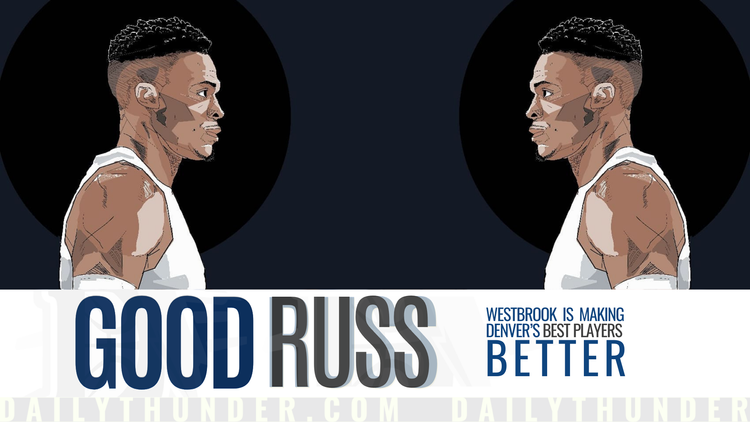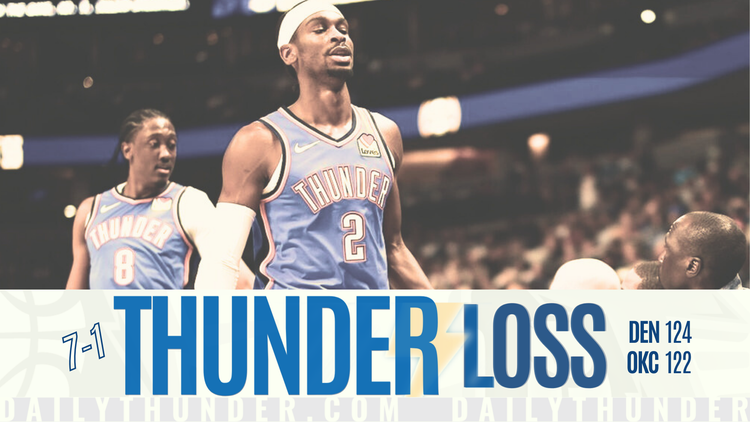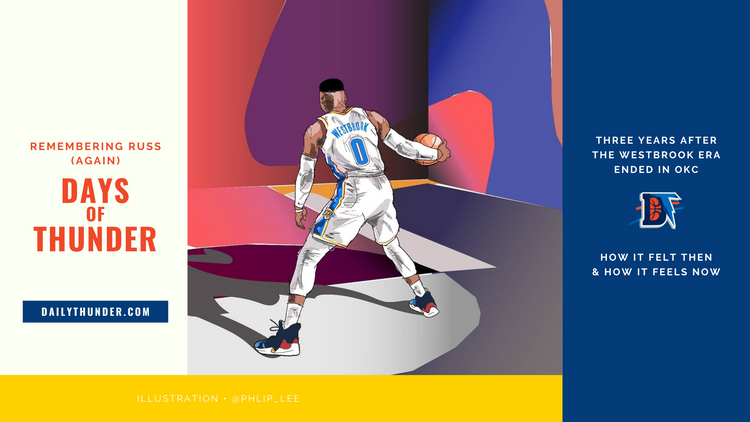Most Valuable Westbrook


July 4, 2016.
After Kevin Durant announced his intention to join three All-Stars in Oakland, and conspicuously leave one All-Star behind in the process, attention quickly turned to Russell Westbrook. Would he be traded? Was he at fault for Durant leaving? What does he really think of Durant?
For the most part, Westbrook remained mostly silent over the next thirty days, but on August 4, a simple Tweet brightened the darkest moment in Oklahoma City Thunder history.
— Russell Westbrook (@russwest44) August 4, 2016
Just thirty days after Durant broke the hearts of Thunder fans by leaving, Westbrook restored hope by giving the Thunder a commitment to stay.
Throughout his career, Westbrook has been an enigma. Constantly criticized, but continually impressive. Vilified as being a ballhog, a brick machine, selfish, rude, petulant, and having a low basketball IQ, while at the same time creating awe with his unmatched talent and athleticism. But through it all, Westbrook too often served as the punching-bag-sidekick to the glorified Durant.
As a member of the Thunder, Durant was the face of the franchise. He was the supposed humble player who was happy living in Oklahoma City and just playing ball. He endeared everyone by his wholesomeness—carrying a backpack with a Bible, playing flag football with students at Oklahoma State, and comforting victims affected by devastating tornadoes in May 2013. Durant seemed the perfect superstar for a town like Oklahoma City. Rightfully, Durant was adored for his service and commitment to the community. Durant wasn’t just playing for a team in Oklahoma, it felt like he was an Oklahoman.
So when Durant won the 2013-14 NBA MVP award, hundreds of fans in Oklahoma City showed up just for the opportunity to stand outside the building where Durant would receive the prestigious award. It was an individual accomplishment, but one that the community felt a part of. One of Oklahoma’s own receiving the highest honor that can be bestowed upon an individual player.
And through it all, Westbrook was the sidekick. Loved, no doubt, by Oklahoma City, but by no means nearly as embedded in the hearts of Thunder fans.
At least until July 4, 2016.
It’s not fair to say Thunder fans made a mistake in their support of Durant. Durant certainly wasn’t who he was perceived to be (in fact, Durant told Bill Simmons that the excitement of being a villain motivated him, in part, to leave). But neither was Westbrook. Westbrook was not a selfish ballhog depriving Durant of shot opportunities; rather he was a fierce competitor who was driven to play one way—fully committed.
And on August 4, 2016, Westbrook signed a multi-year extension, fully committing himself, not to rebuild the Thunder, but lead it. The significance of the extension cannot be downplayed. Westbrook wants to win—this is a guy who we’ve seen mount double-digit comebacks virtually on his own (even in games that have no meaning) because he can only give a winning effort—so, committing to a team that would have the shadow of the departed Durant looming over everything was not just significant, it was monumental. And now, as we look to the playoffs and look back on the season, Westbrook never once spent a moment in the shadow of the departed Durant this year. He cast his own.
By most accounts, this season isn’t that impressive. Forty-seven wins and a six seed. Only the injury riddled season of 2014-15 and the Thunder’s first in 2008-09 were worse in terms of performance. Despite that, Westbrook gave the Thunder and Oklahoma City a magical season that made Durant’s exodus empowering rather than devastating.
Westbrook offered all Thunder fans a front-row seat to history, breaking an unbreakable record that stood for 55 years. With the chase of a championship paused, Westbrook took a transition year and made it transformational. By racking up 42 triple doubles, Westbrook gave Thunder fans (and fans around the league) the chance to experience a “I remember when” moment. Decades from now, with a sense of pride that Westbrook wore a Thunder jersey, we can all say we were a witness to the impossible.
But it wasn’t just his pursuit of the triple double record that rewarded us when we watched. You never knew when Westbrook would do something amazing. He did the Shammgod, delivered a nutmeg pass for the ages, scored 15 straight points to steal a win one night, 12 of the final 14 another night, and emphatically capped off triple-double number 42 with a buzzer-beating game winner.
Westbrook made this season as special as any by readily embracing his new role as the leader of the team, willingly taking on the immense responsibility of every win and every loss. In many respects, Westbrook was the captain of the Titanic this year, except he refused to allow the ship to sink. And the incredible accomplishment of averaging a triple double this season, and notching 42 triple doubles, was demonstrable evidence of Westbrook playing the same way he’s always played—fully committed—but elevating his performance to meet greater challenge of having the weight of the franchise singularly on his shoulders.
Maybe we missed it the first eight years of his career, blinded by our affection for Durant, but we should never forget it now.
Westbrook has always been our MVP.
(And he should be the NBA’s, too.)




